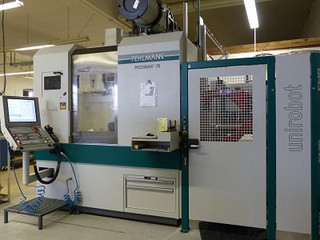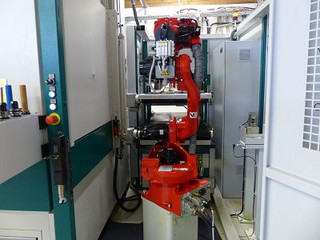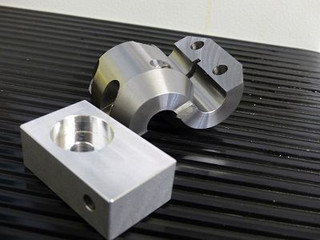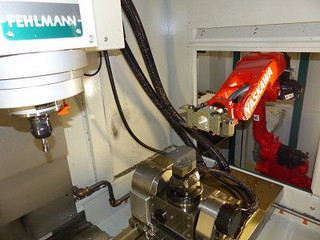Individual Standard for High Demands
Märkische Schraubenfabrik - Economic manufacturing often requires special solutions. With Märkische Schraubenfabrik, it was no different. The material is hard to machine, the raw part must be fed into the machine and machined completely on six sides before being properly unloaded and deposited. Therefore, the Berlin-based company opted in favor of the Fehlmann PICOMAX 75 machining center in connection with an articulated robot. After being in use for one year, this concept has proven that the company made the best choice possible for the existing product line-up and quality requirements.
Back in 2013, managing director Frank Krüger was already enthusiastic about the Fehlmann PICOMAX 56 TOP. He was impressed not only by the manual operation of the machine using drilling levers and handwheels, but also by its CNC control unit. At first, he intended to use this milling and drilling machine in order to supplement production of predominantly turned parts with additional machining options. However, after only a short period, he realized the true potential of the machine and was able to reduce the number of outsourced milling jobs. From then on, the PICOMAX 56 TOP was in operation almost non-stop. Due to the consistently positive experiences, as well as customer enquiries, the people responsible at Märkische Schraubenfabrik then decided to upgrade their milling capacity and invested in an automated cell in 2017.
They specifically invested in a Fehlmann PICOMAX 75 machining center with 4th/5th axis thanks to the automatic CNC dividing / swiveling attachment ATS 200, as well as an articulated robot by FMB. The plan was to have the sawed blank fed into the machine, machine it on five sides, turn it around for cutting the sixth side and then have the finished part unloaded via a conveyor belt. In the opinion of Managing Director Phillip Böwe, this solution makes sense both from an economic and ergonomic point of view. "We had received a customer enquiry from the medical technology sector. We started producing the components on the PICOMAX TOP 56. The result was excellent. However, we were aware that a lot size of 1,000 units per month was impossible to realize economically on this machine without automation. This is why, at first, we planned to outsource the production. Unfortunately, the intended outsourcing failed because of insufficient quality. For one thing, stainless steel 4301 is hard to machine. Secondly, the parts must be absolutely free of burrs. Therefore, we searched for appropriate solutions. We already had experience with articulated robots from turning applications, which is why we intended to implement this concept with the Fehlmann machine as well". This means that we gathered information about both appropriate machines and automation solutions through intensive benchmarking. Regarding the machine, two manufacturers were ruled out relatively quickly due to lack of the required process stability. In the "finals", Fehlmann's PICOMAX 75 came out on top due to its footprint, the lateral automation option, and our experience with the PICOMAX 56 TOP. The investment in the articulated robot variant was made for a variety of reasons. First, a standard automation, for example with a palletizing system, would have been too cost-intensive due to the numerous vices/fixtures. For machining the sixth side, an additional clamping solution was necessary. In addition, we wanted to minimize the risk of injuries to the operators when handling the sharp stainless-steel edges (burr formation).
Intelligent automation offering the great advantage of high flexibility
Today, the automation system at Märkische Schraubenfabrik is used to produce four part families as well as numerous fixtures. The machining cell is running 24/7, even in unmanned operation over the weekends, so that it is operating to full capacity. The machine is equipped with an oil cooling system. Why oil? Because, according to Phillip Böwe, oil cooling helps to achieve higher surface qualities, extend tool life and reduce burr formation. True, such demands on automated machining centres are not necessarily commonplace. At least not in this machining segment. Robert Fehrle, Technical Advisor at Fehlmann, however, explains that this was no problem at all in the eyes of Fehlmann: "Even though this is the first PICOMAX 75 complemented with an articulated robot, Fehlmann solved the problem by contacting FMB and exchanging the data for the interface. After this, the solution was simple, as FMB had a complete cell suitable for a multitude of possibilities. As we are using oil as a cooling medium, different pumps, a different leakage sensor and a fire protection system were necessary. This, however, was also no problem for us." First, we put the PICOMAX 75 put into operation. Only two weeks later, we had the articulated robot in operation as well and the system was up and running.
Next to the sophisticated automation - the robot is used for lot sizes of approx. 50 pieces and above - this system configuration additionally offers the great advantage of high flexibility. As Phillip Böwe puts it: "We are able to retool the system within minutes and also process single parts or very small batches. In many cases, an inclined borehole must be drilled into the semi-finished part after the turning process. With our Fehlmann machine, we can easily do this manually and in between jobs".
Märkische Schraubenfabrik at a glance
The company was founded in Berlin-Kreuzberg in 1934. Today it is a medium-sized family business in its third generation and focuses on production of turned parts predominantly on long turning machines. With the investment in the PICOMAX 75, however, the enquiries in the area of milling are also continuously increasing. Production covers lot sizes from a few units (prototype manufacturing in series conditions) up to approx. 500,000 parts per year.
The circle of customers includes companies from the hydraulic industry, railway security engineering, and apparatus construction.
By the way ...
Fehlmann's excellent customer service also adds to the positive experiences with the PICOMAX 56 TOP. In case of problems, a service employee arrived on site within 24 hours.
As a side note
The PICOMAX 75 has 50 tool pockets and the FMB Unirobot system accommodates material for 35 operating hours at the Berlin-based company. Furthermore, chips and cooling lubricant adhering to the finished parts are removed in a blow-off box after the machining process.
Contact
Märkische Schraubenfabrik
Alfred Brückmann GmbH & Co. KG
Herr Phillip Böwe
D-12277 Berlin-Marienfelde
Tel. + 49 30/6127447
www.m-s-f.de




